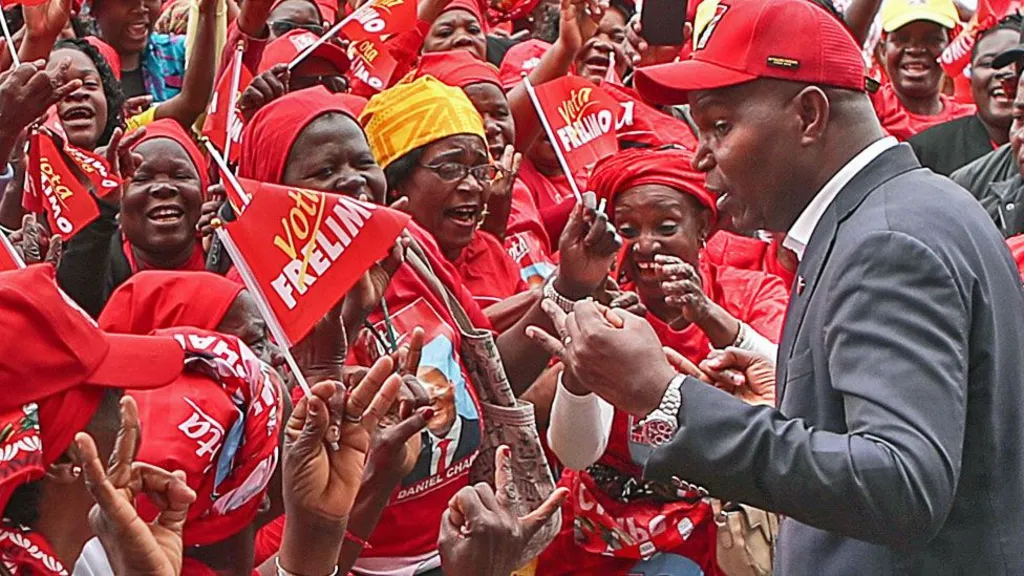New Era in Mozambique: Fresh Leadership Emerges Amidst Political Transition
3 min read
Daniel Chapo has promised that Mozambique will enter a period of "renewal" if he wins

Daniel Chapo has promised that Mozambique will enter a period of "renewal" if he wins
Mozambique is gearing up for a pivotal election that signifies the end of an era dominated by leaders shaped by the country’s struggle for independence from Portuguese rule. This election marks a significant shift, with the ruling Frelimo party presenting a presidential candidate, Daniel Chapo, born after the end of colonialism.
Chapo, a dynamic 47-year-old, is seen as a potential catalyst for change, appealing to voters weary of Frelimo’s nearly 50 years in power. Political analyst Charles Mangwiro notes that the party has faced considerable public backlash, with campaigners being booed and openly rejected in some regions.
The upcoming elections, set for Wednesday, will include presidential, parliamentary, and gubernatorial races. President Filipe Nyusi, who is completing his second term, hopes to pass the baton to Chapo amid a backdrop of economic challenges, including the fallout from a corruption scandal linked to “tuna bonds” that severely impacted the nation’s economy.
Chapo has managed to galvanize support at campaign rallies across the country, distancing himself from the corruption that has marred Frelimo’s legacy. His campaign slogan, encapsulated in a popular song, resonates with voters: “Brother Dan is honesty in person… He is the voice of hope we want to embrace… It’s time for change.”
However, skepticism remains regarding his ability to enact real reform. Human rights activist Mirna Chitsungo expresses doubts, arguing that Chapo’s affiliation with Frelimo complicates his credibility. “If we have a degraded country, it is because of corruption. He faces the challenge of promising to fight this evil while belonging to a party that, on a large scale, has perpetuated corruption,” she states.
Chapo’s relative inexperience in politics may work in his favor. He only entered government in 2011, serving as a district administrator before becoming the governor of Inhambane province and then Frelimo’s general secretary. Yet, critics allege that Frelimo may resort to electoral fraud to secure Chapo’s victory.
Research from Centro de Integridade Pública indicates that around 5% of the names on the voters’ roll may be fraudulent—amounting to nearly 900,000 “ghost voters.” Analyst Joe Hanlon highlights that discrepancies in the data suggest that certain provinces have registered more voters than eligible adults, raising concerns about electoral integrity.
Despite these allegations, both the election commission and Frelimo assert that the elections will be conducted fairly. Chapo faces competition from three other candidates: Venâncio Mondlane, an independent; Ossufo Momade from the main opposition party Renamo; and Lutero Simango of the Democratic Movement of Mozambique (MDM).

Mondlane, a newcomer to presidential politics, has rapidly gained traction, especially among younger voters, with his rallying cry of “Save Mozambique – this country is ours.” His campaign is marked by an appeal to national pride and economic empowerment, drawing significant crowds at his events.
Previously a banker, Mondlane made headlines when he contested the mayoral election in Maputo last year, where he claimed victory amid allegations of rigging against Frelimo. His departure from Renamo after a leadership struggle has positioned him as a fresh contender in this election.
Momade, who succeeded the late Afonso Dhlakama as Renamo leader, previously ran for the presidency in 2019, alleging that he was denied victory through electoral manipulation. He remains committed to the peace deal that ended the civil war between government forces and Renamo fighters but faces challenges from Mondlane’s growing popularity.
Chapo is strategically positioning himself to capitalize on any split in the Renamo vote between Momade and Mondlane. To bolster his campaign, he has even reached out to the Mozambican diaspora in South Africa, urging them to support him.
While issues such as the insurgency in Cabo Delgado have not emerged as central themes in this election cycle, analysts agree that any incoming president will face the formidable task of addressing widespread poverty—62% of the population lives on less than $1.90 a day.
As the final campaign rallies conclude, the race remains wide open, with no clear frontrunner. “It’s too close to call,” Mangwiro concludes, emphasizing the uncertainty surrounding the upcoming elections. The outcome will not only determine the country’s leadership but also set the tone for Mozambique’s future as it navigates the challenges ahead.